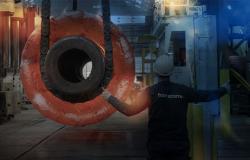Israel is set to significantly increase the number of tankers docking at its Red Sea port of Eilat, driven by the need to strengthen energy security tic in the face of growing regional conflicts. The decision, however, has raised serious environmental concerns due to potential risks to the delicate coral reefs and surrounding ecosystems.
Prime Minister Benjamin Netanyahu’s office has argued for lifting current restrictions on oil unloading in Eilat, a strategic crossroads between the Red Sea and the Mediterranean. These restrictions were initially imposed in 2021 by the Ministry of Environmental Protection, effectively interrupting an ambitious oil supply agreement with the United Arab Emirates (UAE). These restrictions had been temporarily eased due to the war with Gaza, and now there are plans for a more permanent increase in capacity.
State-owned Europe Asia Pipeline Co. (EAPC), which operates a strategic pipeline linking the Red Sea to the Mediterranean, is seeking to increase the volume of oil transported through Eilat . This pipeline offers an alternative to the Suez Canal for oil shipments destined for Europe. Despite the strategic importance, the plan faces strong opposition from environmental regulators and local authorities.
Strategic necessity amid conflicts
Israel’s decision comes at a time of heightened security concerns, with ongoing conflicts involving Hamas in Gaza, Hezbollah in Lebanon, as well as threats from Iranian proxies in Yemen and in Iraq. These multifaceted threats underscore the urgency for Israel to secure a reliable energy supply to support its economy and support its military operations.
The recent brief closure of Israel’s Tamar gas field, a critical energy Source, at the start of the conflict with Hamas, highlighted the vulnerability of the infrastructure national energy. Additionally, disruptions caused by the Yemeni Houthis in the Red Sea have forced sea routes to be redirected to Mediterranean ports, complicating logistics and increasing costs.
EAPC expansion ambitions
The 2020 EAPC agreement aimed to transport significant volumes of oil from the UAE to Europe via Israel. This agreement, concluded following the normalization of relations within the framework of the Abraham Accords, provided for the docking of around 50 tankers per year in Eilat, a significant increase compared to the previous average of two tankers per year. However, the Ministry of Environmental Protection’s strict policy of “not increasing risks” limited this volume to two million tonnes, blocking the agreement.
The coral reef near Eilat, renowned for its resilience to climate change, is highly susceptible to oil spills, making even minor incidents potentially catastrophic. Despite this, a recent report from Netanyahu’s office argues in favor of increasing the volume of oil imported via Eilat, emphasizing the need for flexibility in energy policy tick in the face of security threats.
Regulatory and environmental challenges
The Israeli government has tasked the Ministry of Environmental Protection with developing a plan to manage the risks associated with increased oil deliveries. However, the ministry expressed strong objections, saying its concerns had been overlooked and that it lacked the resources to effectively monitor the proposed increases.
Past incidents, such as a pipeline rupture in 2014 that led to a major oil spill in a nature reserve, highlight the environmental risks involved. The Environmental Protection Ministry remains opposed to increasing oil deliveries to Eilat, citing the potential for similar disasters.
Economic and diplomatic dimensions
The oil deal with the UAE presents substantial economic promise, potentially generating around $50 million per year for the EAPC. However, uncertainties remain over the viability of the agreement, even if the limitations on Eilat are lifted. Petromal, an Abu Dhabi-based subsidiary of National Holding and a key shareholder in the deal, has not commented on the current situation.
EAPC President Erez Halfon welcomed the government’s support, emphasizing the strategic importance of the EAPC’s Eilat facility, particularly in the context of ongoing conflicts. He warned that without consistent oil deliveries, the reliability and operational availability of the facility could be compromised.
Israel conducts almost all of its trade by sea, mainly through Mediterranean ports. In 2023, the country imported around 267,000 barrels of crude oil per day, mainly from Kazakhstan, Azerbaijan and Kurdistan.
Future prospects and implications
The Israeli government has tasked the Ministry of Environmental Protection to conduct a thorough investigation and present a risk management plan within three months. This directive sparked debate within government, reflecting the tension between immediate economic and strategic needs and long-term environmental sustainability.
As Israel navigates its complex security landscape and seeks to ensure energy stability, the decision to increase oil tanker dockings in Eilat highlights the challenge broader aim of balancing economic imperatives with environmental preservation.
Going forward, the outcome of this policy change will be closely scrutinized by industry players, environmental groups and international partners, as it could set a precedent on how nations address competing demands for energy security and environmental protection.
By Julianne Geiger for Oilprice.com
More must-reads on Oilprice.com:






